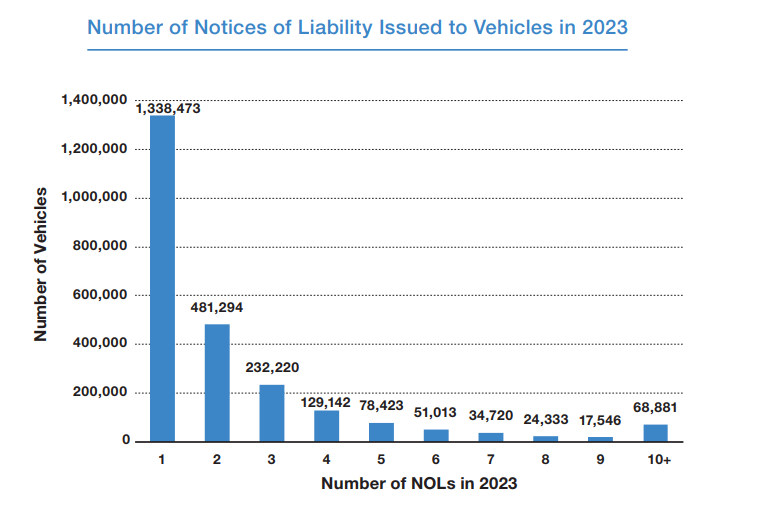Tranquilizing the superspeeders
Why we shouldn't see police enforcement and camera/tech enforcement in opposition to each other
Last month’s triple pedestrian fatality on Brooklyn’s Ocean Parkway at the hands of an allegedly speeding driver whose car had racked up a non-allegedly two-dozen plus speed- and red-light camera tickets has spurred calls for Albany to enact a superspeeder law.
Source: How’smydrivingny.nyc .
The law would force the owners of vehicles with a history of 6+ camera tickets over 18 months to install automatic speed governing technology in their vehicles.
Here is what I wrote about this idea in a little newspaper called the NYT (gift link):
“The city’s once-controversial red-light and speed cameras, which operate under state law, have produced millions of lines of data, telling us something urgent: A minority of bad drivers persistently engage in aberrant behavior.”
And here’s a city chart illustrating that most people learn their lesson and stop speeding and running lights after one or two tickets (or, at least stop speeding near cameras, which, since there are a lot of cameras, is something):
Queens city councilperson Vickie Paladino raised a bunch of objections to the superspeeders bill, some of which are inaccurate (the streets are not more lawless than ever, for instance — in reality, traffic deaths last year were just 36 percent of 1990 levels, in part because of camera enforcement).
But her main objection is that police should be doing this work, not cameras: “We should be allowing the police to pursue these drivers, and conduct aggressive traffic stops for any perceived violations.”
Since this argument is a common objection, it deserves a respectful, considered answer, and that answer is simple: there is no need to choose between police traffic stops and camera traffic stops.
Paladino says that much of the left doesn’t want policing at all, but the answer to that is, so what? We can ignore the left on getting rid of the police, which is a bad idea, but steal the left’s good idea, which is to enforce a basic public-safety and quality-of-life law through easy technology.
Indeed, police traffic stops can and do complement camera enforcement. For example, anti-social recidivist speeders attempt to evade cameras through “ghost” license plates, and police should and do stop drivers with such fake, expired, or wrong-vehicle plates.
Source: NYC DOT.
But: identifying the worst drivers, through their vehicle plates, and restricting those drivers’ ability to speed in those vehicles eases the police burden. Why force police to endanger themselves in issuing speeding ticket after speeding ticket to the alleged Ocean Parkway killer, when the state could have disabled her vehicle from speeding?
Incapacitating recidivists, at least partway, would allow police conducting traffic stops to focus on, in addition to speeding and red-light blowing that they witness, other issues, including vehicles with tinted windows (dangerous since pedestrians and bicyclists can’t see the driver), vehicles whose drivers are illegally playing with their cellphones, drivers who fail to yield to people in the crosswalk, etc.
Police could even spend more time giving e-cyclists tickets!
Camera enforcement also reduces police corruption, as off-duty officers and their families can’t wave away a camera ticket.
Life is full of difficult choices, but this isn’t one … no need to agonize on whether you’d rather police enforce the moving-violation laws or whether you’d rather cameras do it.
The answer is: both, and often!
(My argument against this bill would be the total opposite of Paladino’s … that it doesn’t go far enough. I would impound the vehicles whose drivers are anti-social recidivists and auction them off. But getting part of the way there is better than getting none of the way there!)





